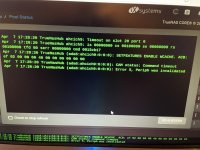Perhaps the T320 is just too slow for it ... but that seems unlikely, bc my SPINNING drives get faster rates.
I'm getting
~650MBs READ
~300MBs WRITE
(Granted, the speeds are VERY consistent) ... but I could get that performance with a single drive).
RAIDz1 array comprised of 6x EVO 870 4TB SSD (SATA) ....
As in, Read is just barely faster than a single drive's performance.
And Write is half the performance of a single drive.
All transfers were of large (1GB+) video files.
Any idea what the bottleneck might be ...?
If I can't get faster than this with a SATA Flash array .....
Seems like a waste to try to build an NVMe Flash array.
I have an R730 I could retry this on, but, I wasn't CPU limited.
Any help of what I could look into would be appreciated.
I'm getting
~650MBs READ
~300MBs WRITE
(Granted, the speeds are VERY consistent) ... but I could get that performance with a single drive).
RAIDz1 array comprised of 6x EVO 870 4TB SSD (SATA) ....
As in, Read is just barely faster than a single drive's performance.
And Write is half the performance of a single drive.
All transfers were of large (1GB+) video files.
Any idea what the bottleneck might be ...?
If I can't get faster than this with a SATA Flash array .....
Seems like a waste to try to build an NVMe Flash array.
I have an R730 I could retry this on, but, I wasn't CPU limited.
Any help of what I could look into would be appreciated.



